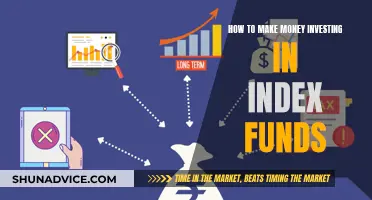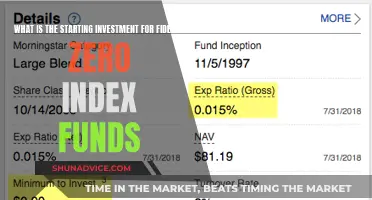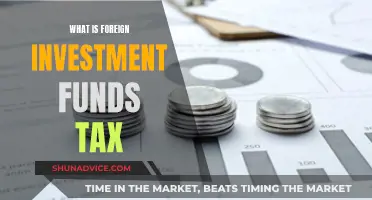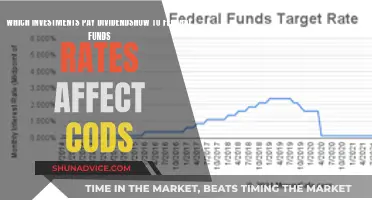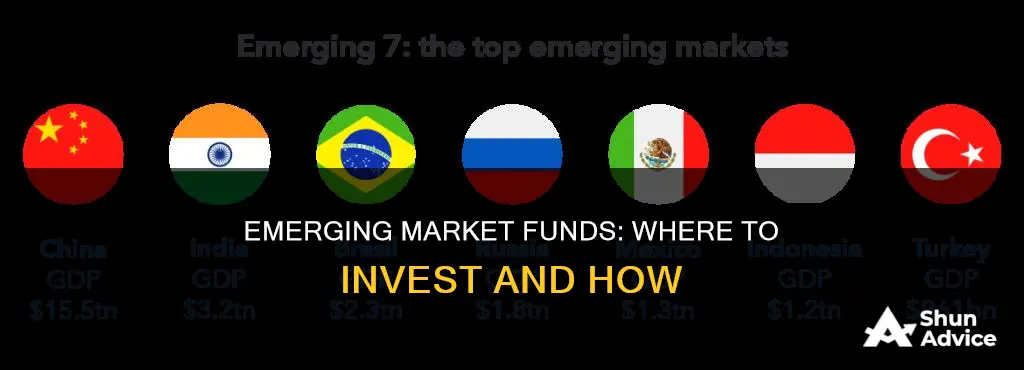
Investing in emerging markets can be a risky but rewarding strategy. Emerging markets are economies transitioning from low-income, pre-industrial economies to modern, industrial economies with higher living standards. They are characterised by volatile markets, higher growth and investment potential, and stronger economic growth. Examples of emerging markets include India, Mexico, Russia, Pakistan, Saudi Arabia, China, and Brazil. The easiest way to invest in emerging markets is through exchange-traded funds (ETFs) or mutual funds that focus on these markets, providing diversification and removing the need for researching individual markets. However, it is important to be cautious as these investments carry higher risks due to factors such as political instability, economic factors, and currency fluctuations.
| Characteristics | Values |
|---|---|
| Definition | Economies that are transitioning from a low-income, pre-industrial economy to a modern, industrial economy with a higher standard of living |
| Examples | Brazil, Russia, India, China (BRIC), Mexico, Pakistan, Saudi Arabia, South Korea, Colombia, Indonesia, Vietnam, Egypt, Turkey, South Africa, United Arab Emirates, Iran, Argentina, Ethiopia |
| Investment Options | Mutual funds, Exchange-Traded Funds (ETFs), American Depositary Receipts (ADRs), U.S.-listed international funds |
| Risks | Political, Economic, Currency, Inflation, Liquidity, Volatility, Geopolitical Instability |
| Rewards | High Growth, Diversification, Higher Returns |
What You'll Learn

Understanding emerging markets
Emerging markets refer to economies that are transitioning from a low-income, often pre-industrial economy towards a modern, industrial economy with a higher standard of living. They are characterised by their volatile markets, higher growth and investment potential, and stronger economic growth. Emerging markets are an attractive investment opportunity for investors seeking growth and diversity in their portfolios. However, it is important to understand the risks involved, including political, economic, and currency risks.
The phrase "emerging markets" was first coined by economists in the early 1980s to define investing in developing countries. While there is no universally agreed-upon definition, most experts agree that it refers to countries or regions undergoing rapid economic growth. A country's gross domestic product (GDP) and per capita income are often used to determine if it qualifies as an emerging market.
Emerging markets are typically classified as having more volatile markets compared to developed markets. This is partly due to their heavy reliance on commodity exports, which have their own cycles. According to research from the St. Louis Federal Reserve, raw materials comprise 71% of aggregate exports in the average emerging economy. As a result, emerging markets often experience more pronounced boom-and-bust business cycles.
Despite the volatility, emerging markets offer higher growth and investment potential. Many of these countries have adopted market-friendly policies to attract foreign investment. Additionally, emerging markets often have a competitive advantage as exporters of low-cost and raw goods to richer nations. This can fuel economic growth and create opportunities for investors.
Another characteristic of emerging markets is their stronger economic growth potential. Governments in these countries often encourage industrialization as they move away from being commodity-based exporters. Emerging markets tend to have younger populations relative to developed economies, as well as government and private investments in technology, infrastructure, and education. These factors can contribute to stronger economic growth and create attractive investment opportunities.
It is important to note that not all emerging markets are alike. Some countries, like South Korea, have become success stories, with stable economies and globally competitive companies. On the other hand, countries like Venezuela and Russia have struggled economically due to poor governance or geopolitical instability. As a result, investing in emerging markets carries a higher level of risk, and it is important for investors to carefully consider these risks before making any investment decisions.
Hedge Fund Titans: Why They Love This Charity Investment
You may want to see also

Advantages of investing in emerging markets
Investing in emerging markets can be a great way to diversify your portfolio and take advantage of the high growth potential that these markets offer. Here are some advantages of investing in emerging markets:
High Growth Potential
The biggest advantage of investing in emerging markets is the potential for high growth. Emerging markets are characterised by rapid economic growth and improving market environments. This growth is fuelled by factors such as industrialisation, technological advancements, investments in infrastructure and education, and a growing middle class. As a result, emerging markets tend to have a strong growth component, offering higher returns and the potential for significant capital gains.
Diversification
Emerging markets can provide excellent diversification opportunities for investors. By investing internationally, you can reduce the impact of economic downturns in any single country or region. For example, if there is an economic recession in the US, investments in emerging markets can help offset the losses in your portfolio. Diversification across different markets and sectors can help reduce overall risk and improve long-term returns.
Competitive Advantage
Many emerging markets have a competitive advantage as exporters of low-cost raw goods to richer nations. They may also benefit from market-friendly policies, favourable trade agreements, and access to natural resources. These factors can attract foreign investment and further boost economic growth.
Long-Term Growth Potential
While emerging markets can be volatile in the short term due to various risks, they often exhibit strong long-term growth potential. By maintaining a long-term perspective and staying informed about global economic trends and geopolitical events, investors can benefit from the upward momentum that emerging markets can provide during boom times.
Access to Innovative Companies
Emerging markets are home to innovative companies that can offer attractive investment opportunities. For example, China is known for its technology giants, such as Alibaba and Tencent, while South Korea is the base for global brands like Samsung Electronics, Kia, and Hyundai. These companies have contributed significantly to the success stories of their respective emerging markets.
Index Funds: When to Start Investing for Maximum Returns
You may want to see also

Risks of investing in emerging markets
Investing in emerging markets can be a risky business. While it's true that emerging markets have been a popular investment area since the early 2000s, offering high growth potential and diversification opportunities, there are a number of risks that investors should be aware of.
Firstly, there is political risk. Emerging markets may have volatile governments, and political unrest or instability can have serious consequences for the economy and investors. Political risk also refers to the uncertainty of government actions and decisions, which can include war, tax increases, loss of subsidies, changes in market policy, and inability to control inflation.
Secondly, economic risk is a major factor. Emerging markets may suffer from insufficient labour and raw materials, high inflation or deflation, unregulated markets, and unsound monetary policies. They are also more susceptible to economic risks such as interest rate fluctuations and debt defaults, which can be made worse by external factors like changes in global trade policies.
Currency risk is another significant issue. The value of emerging market currencies compared to major currencies like the US dollar can be extremely volatile, and currency devaluations can erode the value of an investment.
Liquidity risk is also higher in emerging markets due to less developed financial markets and regulatory systems. This can result in higher broker fees and increased price uncertainty, as well as difficulty in buying or selling securities at the desired price.
Additionally, emerging markets may have regulatory risk, with less developed regulatory systems that can create uncertainty and risk for investors, including weak corporate governance and inadequate legal protections.
Furthermore, there is the risk of non-normal distributions. While North American market returns typically follow a pattern of normal distributions, emerging market securities do not follow the same patterns, making it difficult to value or analyse them accurately.
Other risks include lax insider trading restrictions, difficulty in raising capital due to poor banking systems, and a potential increase in bankruptcy due to poor accounting audit procedures.
Overall, while investing in emerging markets can offer high rewards, it is crucial for investors to carefully consider and evaluate these risks before jumping in.
Trust Fund Strategies: Investing a Million-Dollar Inheritance
You may want to see also

How to invest in emerging markets
Emerging markets are economies transitioning from low-income, pre-industrial economies to modern, industrial economies with a higher standard of living. They are characterised by volatile markets, higher growth and investment potential, and stronger economic growth.
There are several ways to invest in emerging markets, each with its own advantages and considerations:
- Exchange-Traded Funds (ETFs): ETFs are a popular option for investing in emerging markets as they offer quick and easy investment, diversification across multiple emerging markets, and remove the need for researching individual markets. Examples of ETFs that focus on emerging markets include the iShares MSCI Emerging Markets Index ETF and Vanguard Emerging Markets (VWO).
- Mutual Funds: Mutual funds that focus on emerging markets can also provide diversification and exposure to these markets. Examples of mutual funds in this category include the American Funds Emerging Markets Bond Fund and the American Century Emerging Markets Fund.
- American Depositary Receipts (ADRs): ADRs are non-US company stocks that trade on US stock exchanges, with prices following the prices of these companies in their home markets. Examples of emerging market ADRs include Taiwan Semiconductor Manufacturing (TSM) and Indian bank ICICI Bank (IBN).
- U.S.-listed international exchange-traded funds and mutual funds: These funds hold many companies at once, offering diversification and access to shares that individuals may not be able to access directly.
Factors to consider
When considering investing in emerging markets, it is important to keep in mind the inherent risks associated with these markets, including political, economic, and currency risks. Additionally, the volatility of emerging markets can result in significant gains or losses, so it is recommended to maintain a long-term perspective and consult a financial advisor to tailor your investment strategy according to your risk tolerance and goals.
China Index Fund: A Guide to Investing in China's Future
You may want to see also

How emerging markets can fit in a portfolio
Emerging markets can be a great addition to an investment portfolio, but they come with a higher risk/return profile. They are characterised by volatile markets, higher growth and investment potential, and stronger economic growth. As such, they can provide a long-term tailwind to your portfolio, offering exposure to companies in fast-growing countries with developing economies.
Advantages of Including Emerging Markets in Your Portfolio
- Growth potential: Emerging markets account for 80% of global growth, almost double their share from two decades ago. They have a competitive advantage as exporters of low-cost and raw goods to richer nations, and many have market-friendly policies to attract foreign investment.
- Diversification: International investments in emerging markets can offset economic downturns in other countries or regions, including the U.S.
- Strong economic growth: Emerging markets tend to have younger populations and receive government and private investments in technology, infrastructure, and education, all of which can fuel growth and wealth.
How to Include Emerging Markets in Your Portfolio
- Exchange-Traded Funds (ETFs): ETFs are a great option to add exposure to emerging markets. You can add an entire country or a combination of countries to your portfolio. For example, the iShares MSCI Emerging Markets Index ETF invests at least 80% of its assets in stocks from emerging markets.
- Mutual Funds: Mutual funds or ETFs that focus on emerging markets can help diversify your investment by offering a blend of stocks from various sectors and countries.
- American Depositary Receipts (ADRs): These are non-U.S. company stocks that trade on U.S. stock exchanges, with prices following the prices of these companies in their home markets. Examples include Taiwan Semiconductor Manufacturing (TSM) and Indian bank ICICI Bank (IBN).
How Much to Invest in Emerging Markets
Due to the higher risk and volatility of emerging markets, it is recommended not to devote a large chunk of your portfolio to these investments. A modest allocation of 5% to 10% can add an extra layer of diversification to your portfolio while providing exposure to the high-growth potential of emerging markets.
Retirement Mutual Funds: Where to Invest for a Secure Future
You may want to see also
Frequently asked questions
Emerging market funds refer to funds that invest the majority of their assets in securities from countries with economies that are considered to be emerging. These funds are typically mutual funds or exchange-traded funds (ETFs) that offer a blend of stocks from various sectors and countries.
Investing in emerging market funds offers the potential for high growth and diversification. These funds provide exposure to companies in fast-growing countries with developing economies, which can lead to higher returns during robust economic growth.
Emerging market funds carry higher risks than developed market countries. These include political risk, economic risk, and currency risk. Political unrest, insufficient resources, high inflation, and currency devaluation can negatively impact investments.
The best way to invest in emerging market funds is through ETFs or mutual funds designed to track the performance of top companies in emerging market countries. These funds allow for easy diversification and remove the need for researching individual markets.


